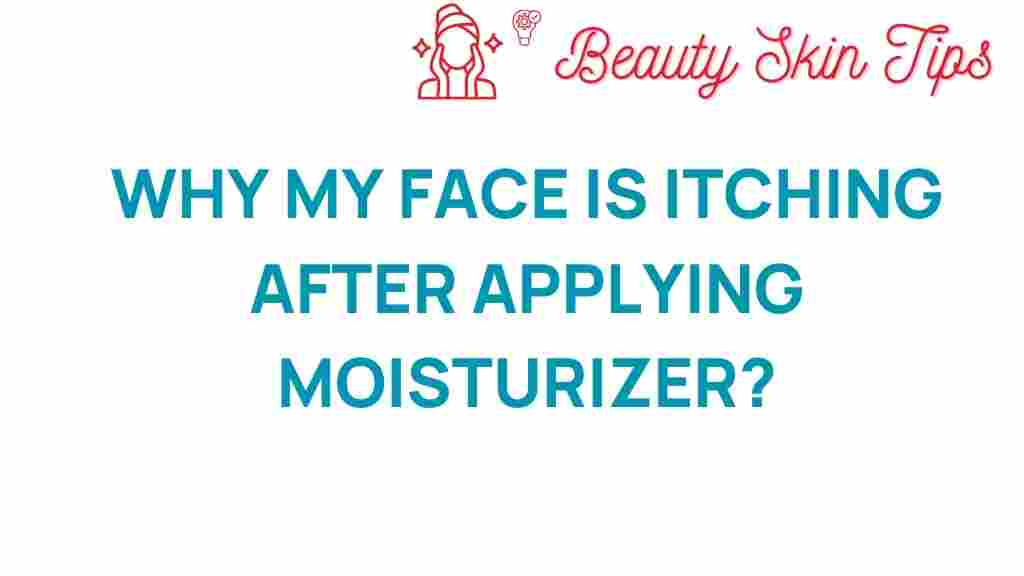The Surprising Reasons Your Face Itches After Moisturizer
Have you ever applied your favorite moisturizer only to find that your face starts to itch shortly afterward? If so, you’re not alone. Face itching can be an incredibly frustrating experience, especially when you’re trying to care for your skin. Understanding the reasons behind this uncomfortable sensation can help you make better choices for your skincare routine. In this article, we’ll delve into the surprising reasons your face itches after applying moisturizer and provide you with tips to alleviate the discomfort.
Understanding Face Itching
Face itching can occur for various reasons, from allergic reactions to environmental factors. It’s essential to recognize that skin reactions can be unique to each individual, and identifying the specific cause of your issue is the first step in resolving it. Let’s explore some of the most common reasons why moisturizers might cause itching on your face.
Common Causes of Face Itching
- Allergic Reactions: Ingredients in your moisturizer may trigger an allergic reaction. Common culprits include fragrances, preservatives, and certain botanical extracts.
- Skin Sensitivity: If you have sensitive skin, even high-quality moisturizers can lead to irritation and itching.
- Occlusive Ingredients: Some moisturizers contain heavy oils or waxes that can trap sweat and bacteria, leading to irritation.
- pH Imbalance: The natural pH of your skin can be disrupted by certain ingredients, causing discomfort and itching.
- Over-Moisturizing: Using too much product can overwhelm your skin, leading to clogged pores and irritation.
Step-by-Step Process: Identifying the Cause of Your Face Itching
Now that we’ve highlighted potential causes, let’s walk through a process to identify the specific reason for your face itching.
Step 1: Review Your Skincare Products
Take a close look at the ingredients in your moisturizer. If you notice any fragrances, parabens, or other additives, consider switching to a fragrance-free, hypoallergenic moisturizer. Look for products labeled as “non-comedogenic,” which means they won’t clog your pores.
Step 2: Patch Test New Products
Before applying any new moisturizer to your entire face, perform a patch test on a small area of skin. Apply a small amount of the product to your wrist or behind your ear and wait 24 hours to see if a reaction occurs.
Step 3: Evaluate Your Skin Type
Understanding your skin type is crucial when selecting a moisturizer. If you have oily or acne-prone skin, choose a lightweight gel or lotion. For dry skin, opt for a cream with rich emollients.
Step 4: Monitor Environmental Factors
External factors, such as weather conditions and pollution, can impact your skin. If you notice increased itching in certain environments, consider using a humidifier indoors or wearing protective clothing outdoors.
Step 5: Consult a Dermatologist
If your itching persists despite making changes to your skincare routine, it may be time to consult a dermatologist. They can help identify any underlying skin conditions, such as eczema or psoriasis, and recommend appropriate treatment.
Troubleshooting Tips for Face Itching
In addition to identifying the cause of your face itching, here are some troubleshooting tips to help alleviate discomfort:
- Switch to Gentle Cleansers: Use mild, fragrance-free cleansers that won’t strip your skin of its natural oils.
- Hydrate Properly: Drink plenty of water to keep your skin hydrated from the inside out.
- Limit Exfoliation: Reduce the frequency of exfoliation, as over-exfoliating can irritate sensitive skin.
- Use Cold Compresses: Apply a cold compress to the affected area to soothe itching and reduce inflammation.
- Apply Moisturizer on Damp Skin: This can help lock in moisture and reduce the likelihood of itching.
Conclusion
Face itching after applying moisturizer can stem from a variety of factors, including allergic reactions, sensitive skin, and environmental influences. By understanding the root causes and implementing the steps outlined in this article, you can minimize discomfort and find a skincare routine that works for you. Remember that everyone’s skin is unique, and it may take some trial and error to find the right products. If you continue to experience itching, consult a dermatologist for personalized advice.
For more information on skincare routines and products, check out this comprehensive guide. And if you’re interested in exploring natural alternatives to commercial moisturizers, visit this resource.
This article is in the category Skincare and created by BeautySkinTips Team
